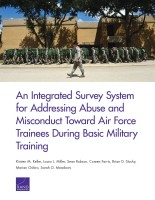| 来源类型 | Research Reports
|
| 规范类型 | 报告
|
| ISBN | 9780833088932
|
| 来源ID | RR-964-AF
|
| An Integrated Survey System for Addressing Abuse and Misconduct Toward Air Force Trainees During Basic Military Training |
| Kirsten M. Keller; Laura L. Miller; Sean Robson; Coreen Farris; Brian D. Stucky; Marian Oshiro; Sarah O. Meadows
|
| 发表日期 | 2015
|
| 出版年 | 2015
|
| 页码 | 198
|
| 语种 | 英语
|
| 结论 |
When Integrated into an Overall Feedback System, the Survey Results Will Give Leadership a More Complete Picture of "Ground Truth" and Point Toward Corrective Actions. - A survey system can augment but should not substitute for direct interaction and monitoring by leadership and by support professionals.
- Spikes in selected abuse and misconduct survey items should prompt follow-up discussions with trainees and MTIs to learn more.
- Anonymous or confidential surveys can provide information that is not available through current formal reporting channels, including barriers to reporting that may exist, so that command can address the issue.
- A comparison between the survey results and known incidents can reveal how many individuals do not feel comfortable coming forward to make a report.
The Surveys Should Be Anonymous or Confidential to the Greatest Extent Possible. - Previous problems were able to escape undetected and escalate in part because individuals were afraid to come forward and directly report problems.
- Anonymity provides actual protection and the perception of protection to encourage participation and honest responses.
- An identifiable survey would be redundant with existing reporting channels.
- The survey system's value will be undermined if participants are required to enter any identifying information to access the survey; if the survey is administered by members in the chain of command or anyone being evaluated on the surveys; or if commanders, law enforcement, or legal staff attempt to discern a participant's identity.
|
| 摘要 |
- The report contains two recommended survey instruments: one for trainees and one for MTIs. Both reflect pretesting in 2013.
- The MTI survey integrates items and constructs from the MTI Quality of Life Survey so that only a single survey is needed.
- All trainees should have the opportunity to complete a survey as they leave BMT; MTIs should have the opportunity at least once a year.
- RAND strongly recommends that a qualified analyst with a background in the social sciences and statistics conduct the analyses and interpret the results. Trainee results should be reported quarterly; MTI results should be reported following each survey.
- For an effective feedback system, AETC should track trends over time, triangulate with other relevant data sources and follow-up data collection, implement a systematic process for reporting results to senior Air Force leaders and other stakeholders, prioritize problem areas and set goals for improvement, and take action where necessary by implementing new policies and improvement plans.
- In addition to the survey system, RAND recommends (1) routinely monitoring security camera footage for prohibited behavior, (2) periodically evaluating whether trainees comprehend and can properly apply the training that prepares them to report abuse and misconduct, (3) following up with victims and witnesses who have filed reports of sexual assault to request voluntary feedback about victim care and the reporting process, and (4) creating an online central repository, accessible by key leadership and support professionals, with aggregate data from the surveys and additional sources of feedback that indicate abuse and misconduct.
|
| 主题 | Enlisted Personnel
; Military Education and Training
; Sexual Abuse
; Sexual Assault
; Survey Research Methodology
; United States Air Force
; Workplace Violence
|
| URL | https://www.rand.org/pubs/research_reports/RR964.html
|
| 来源智库 | RAND Corporation (United States)
|
| 资源类型 | 智库出版物
|
| 条目标识符 | http://119.78.100.153/handle/2XGU8XDN/108138
|
推荐引用方式
GB/T 7714 |
Kirsten M. Keller,Laura L. Miller,Sean Robson,et al. An Integrated Survey System for Addressing Abuse and Misconduct Toward Air Force Trainees During Basic Military Training. 2015.
|
|
文件名:
|
x1509993318383.jpg
|
|
格式:
|
JPEG
|

|
文件名:
|
RAND_RR964.pdf
|
|
格式:
|
Adobe PDF
|
除非特别说明,本系统中所有内容都受版权保护,并保留所有权利。